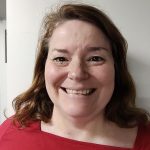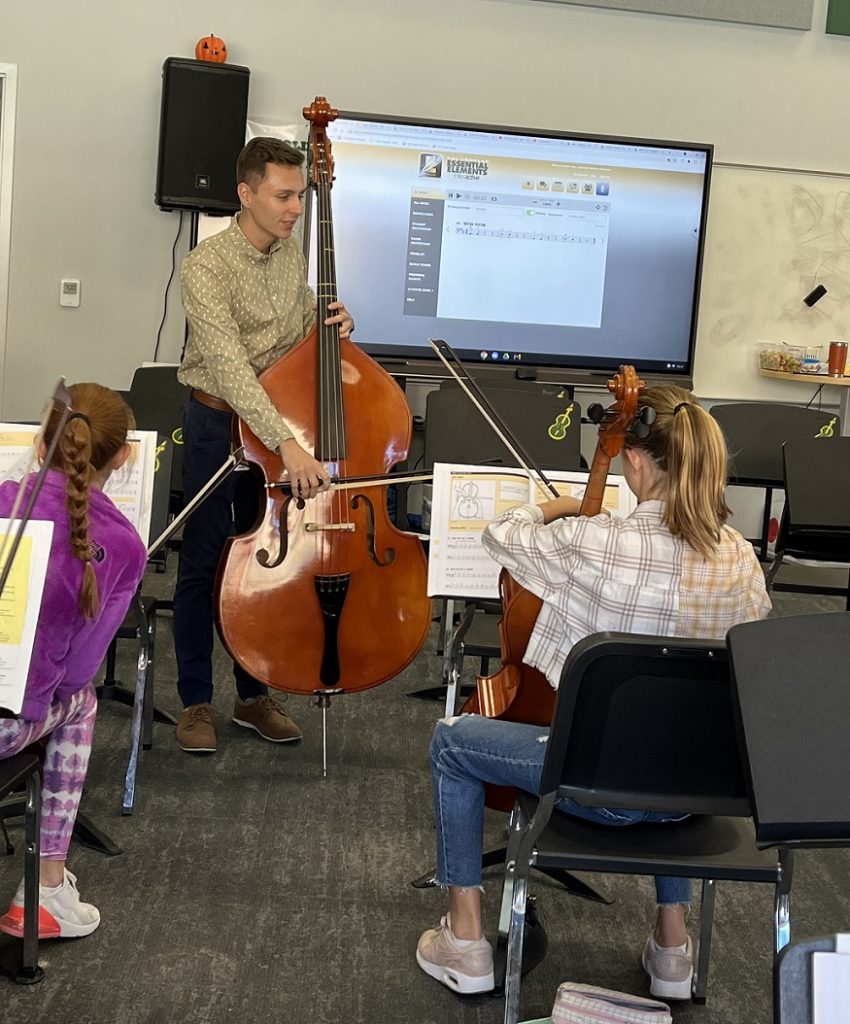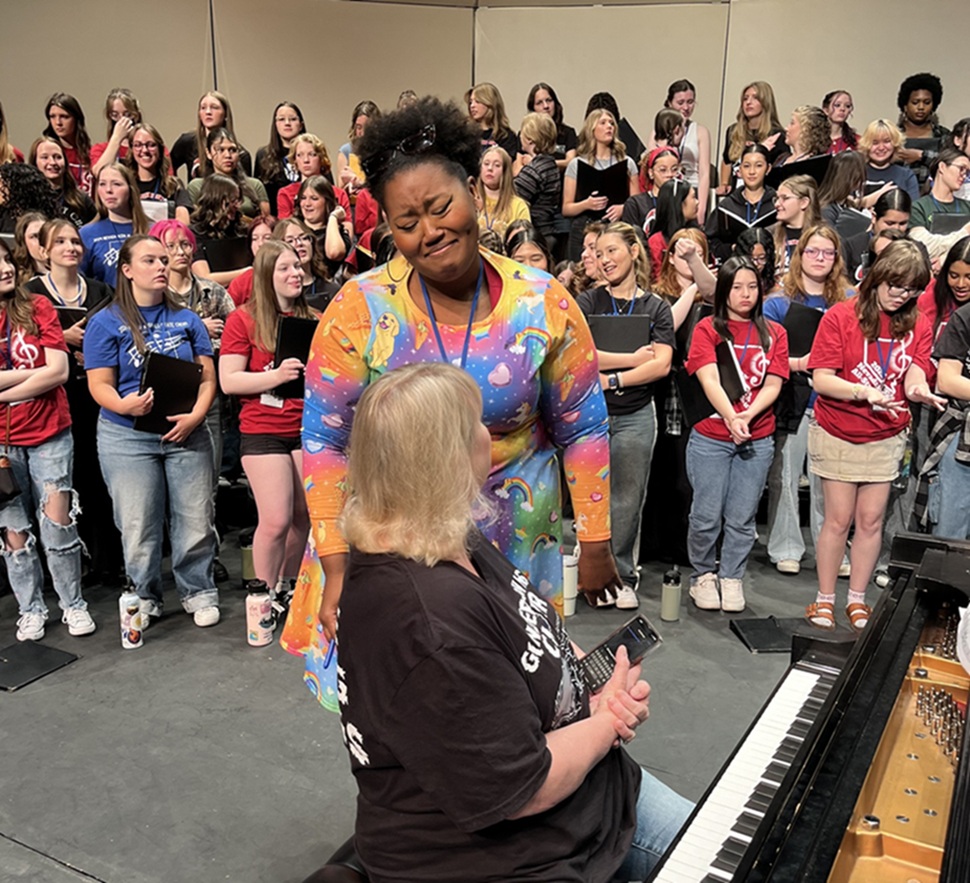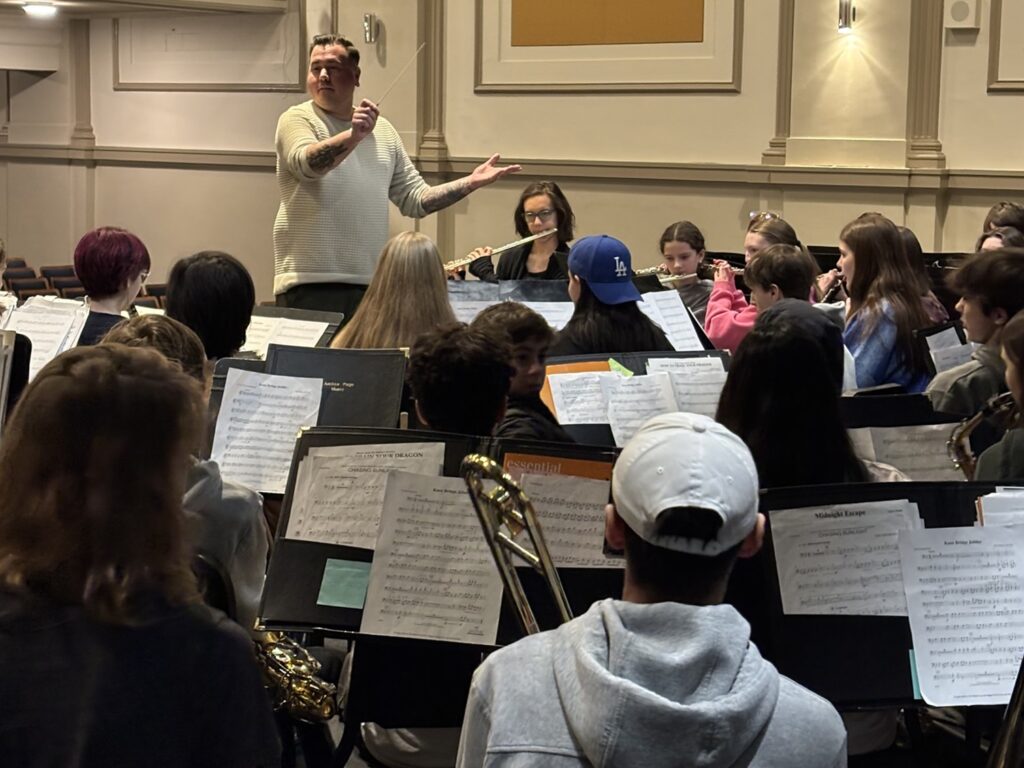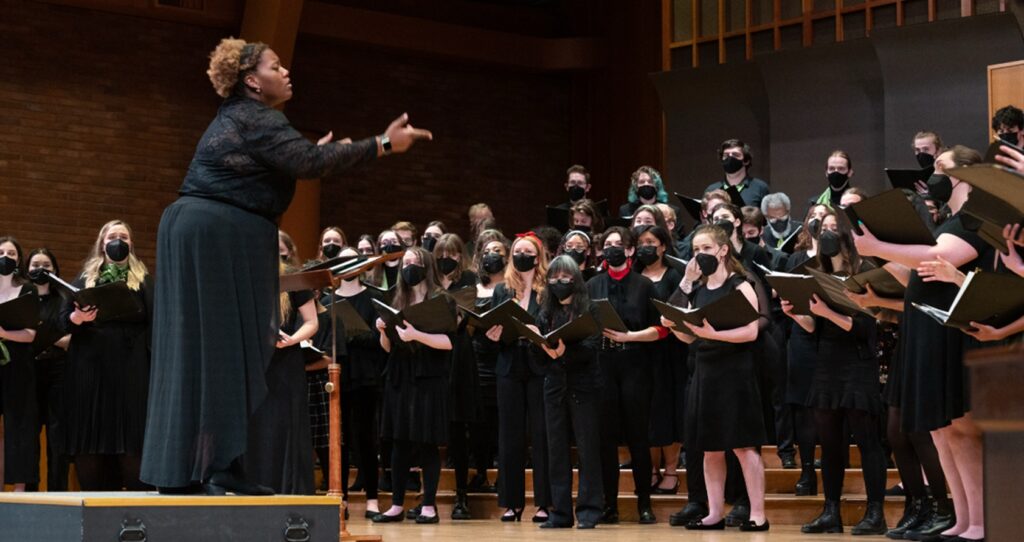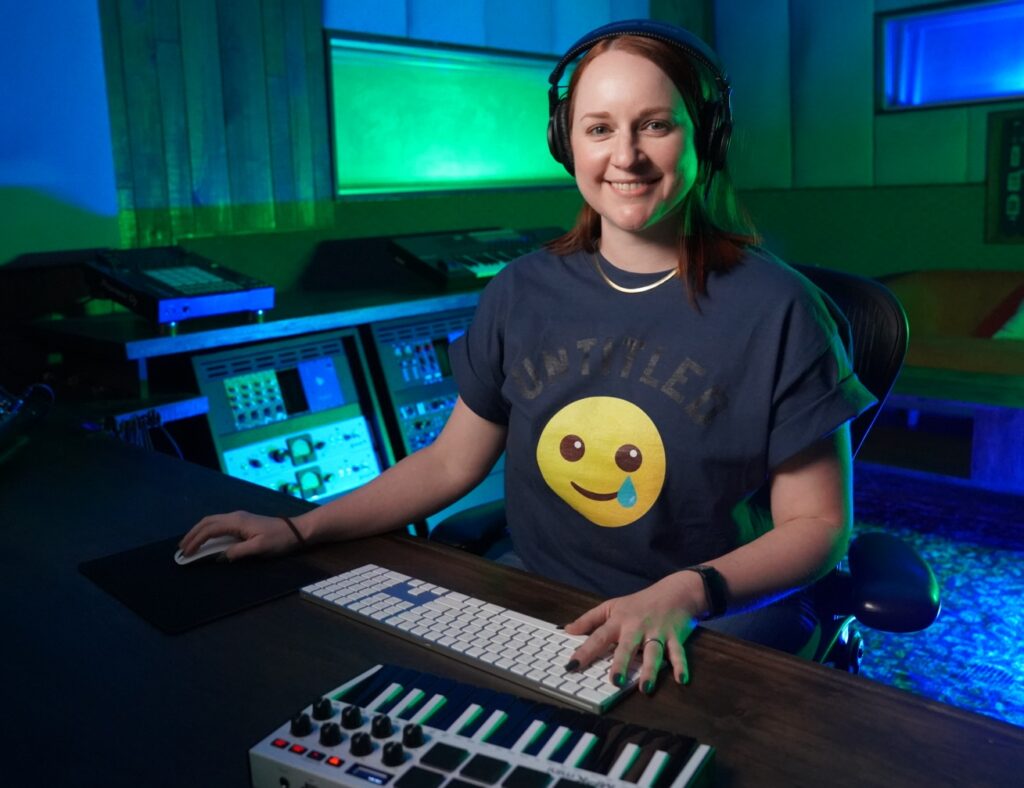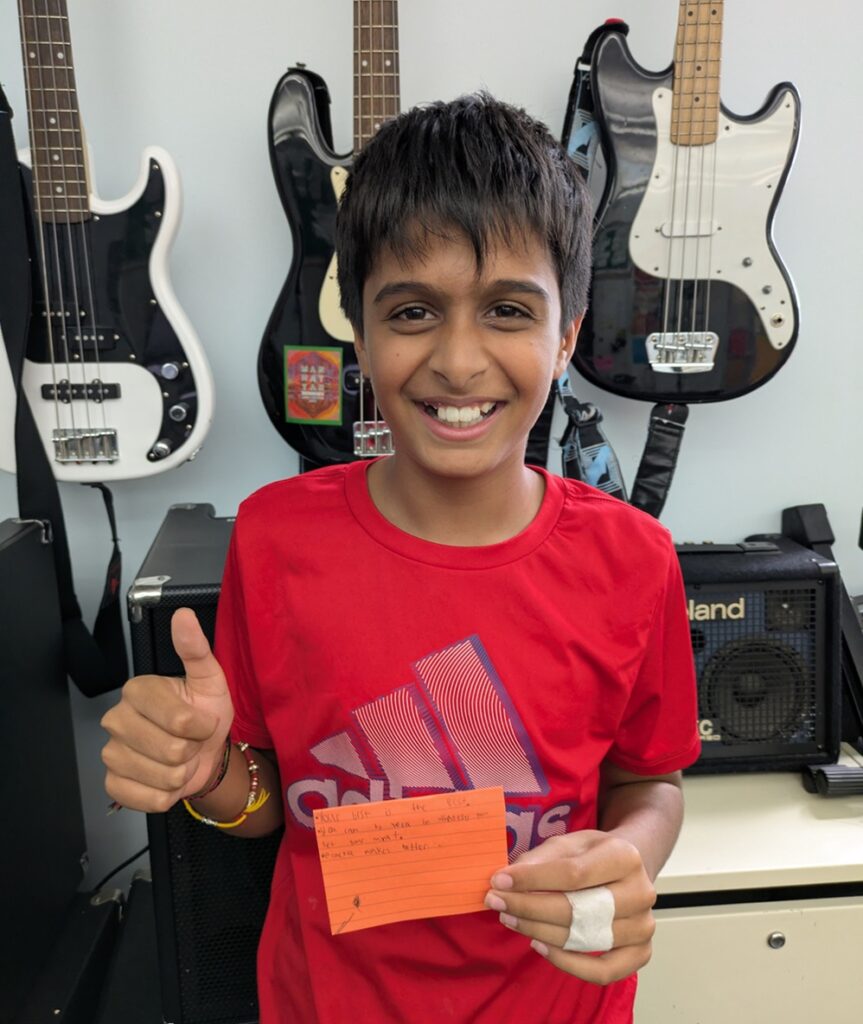Tagged Under:
Make Concerts Memorable and Fun
A South Carolina orchestra director uses creativity to engage her students and the audience.
Julie Anne Russell is known for her off-the-wall concert ideas and her playful methods of teaching music, which she says, result from dreaming really big.
“I make it fun,” Russell says, describing her teaching philosophy. “If it is fun, I can teach the nitty-gritty.”
Russell, who has been the orchestra director at Blythewood High School in South Carolina for about six years, says, “The music is real. It’s just done in a more lighthearted way.”
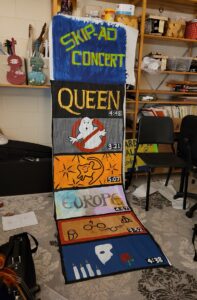
Skip Ad Concert
Russell’s zaniest idea was the “Skip Ad” concert, which she put on two years ago. The idea came to her when she was sitting in her office and listening to music on YouTube, which was interrupted by a forced ad break. Viewers must watch these ads for a few seconds before they can click on “skip” and return to their video.
Russell had an epiphany: Why not create a concert that feels like watching YouTube for the audience? She and some students learned to play songs that the kids’ parents loved when they were young like “Ghostbusters” and “The Final Countdown.” Students painted a tall, skinny poster and decorated it like the recommended video stills on YouTube.
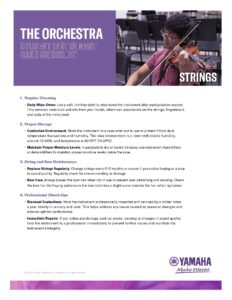
Download this Yamaha Strings Care Checklist for Students now!
During the concert, audience members could choose what happened next. In order to the next piece, they had to watch an ad or donate money to the school’s music program and skip the ad. Students studied ads like those for Liberty Mutual insurance and medications, and made up their own funny ads. They even created an ad for a make-believe musical medicine called “Orchestrina,” which could help if you were feeling blue, needed a tune-up or were feeling out of sync with friends. The side effects of Orchestrina? Better posture, better test scores and friends that will last forever.
“We tried to make it as weirdly accurate as possible,” Russell says with a chuckle at the memory. “The kids just loved it!”
Family members did, too, including little brothers and sisters who usually have a hard time sitting through 90 minutes of classical music; they welcomed the novelty breaks.
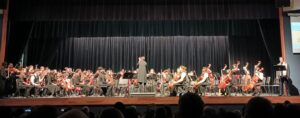
Choose Your Own Adventure
Another unique concert was based on the classic book series where readers create different stories by choosing plot options. This suited Russell because she likes to give students and even audiences choices.
“I’m a big ideas person,” Russell says. “I love having a very small idea and having students in my office, saying ‘Why don’t we do this?’ Students will throw out ideas, and we end up with this interesting idea.”
THE YAMAHA EDUCATOR NEWSLETTER: Join to receive a round-up of our latest articles and programs!
In December, Russell, who was recognized as a 2024 Yamaha “40 Under 40” music educator, invited Blythewood alumni to perform at a concert. She had her students hold up signs after each piece; one said “Circus” and the other sign said “High Seas.” An audience member would choose a sign, and the orchestra would comply and play the type of music the sign represented. Then, the alumni would talk to current students about the adventures they had chosen for their lives after high school. This inspired Russell’s students, she says.
“We have a great time in orchestra; we have a really phenomenal program,” Russell says. “However, my main goal is to shape musicians who are appreciators of music. These kids are not necessarily going to conservatory, but they can hear about how music played such an important role in the lives of alumni. The concert was really fun, and at the end, we had all 91 students plus graduates circle around the auditorium.”
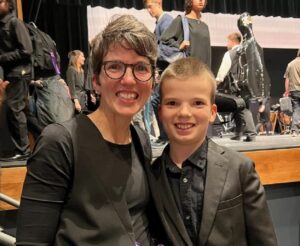
Childrens’ Book Literacy
Russell’s dedication became even more evident during the pandemic, when daily life was upended in 2020. Teaching a subject that doesn’t do remote learning as well as some other subjects, Russell realized how hard she would have to work to retain students in the orchestra. “How do I convince parents to have their kids stay the course?” Russell asked herself.
She wanted parents to tell their children who wanted to quit orchestra to say, “No, this is a good thing for you.”
“I have never met an adult in my life who says, ‘I am so glad my mom let me quit playing the cello,’” says Russell. She repeats this comment at every concert.
Russell wanted to get all of her students into the same place at the same time playing the same piece of music, and for them to work with a professional. How would she accomplish this? Russell and a teacher friend wrote a grant and brought in Netta Hadari, a renowned violinist and conductor from Connecticut, who worked with the kids as they each composed their own short pieces based on a children’s book. Each student wrote out the music by hand.
“We were able to tie in literacy — not just musical literacy, but how well were they able to understand the book and the literature side of it,” Russell says. “It was a huge undertaking.”
Through this project, Russell showed parents the progression their children will experience if they keep playing an instrument.
“Students were able to schmooze with some professionals,” she says. “All around, it was probably one of the most exciting things I’ve done in my life.”
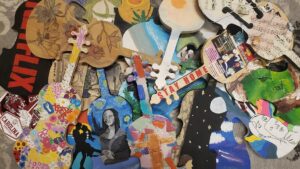
Giving Back
Russell carries on the school’s Painted Fiddle Project, which began in 2009 when one of the orchestra parents, who is an artist, made wooden fiddles and sold them at concerts. In 2018, one of her students asked if she could revive the program as a senior project, and Russell enthusiastically agreed.
Russell and her father, Jim Wilson, cut out fiddles from maple plywood and members of the school’s National Honor Society painted the fiddles and auctioned them off at each concert. The proceeds support the orchestra program, and at the end of the year, the school donates money to the University of South Carolina’s string projects as a way to give back to the community.
Thanks to grant money, Russell’s students also had the privilege of participating in a workshop and enjoying a concert by Violins of Hope, a group that collected violins, violas, and cellos after World War II. Many of the instruments belonged to Jewish people before and during the war, and families of Holocaust survivors donated many of the instruments. Learning about this period of history was moving for Russell’s students.
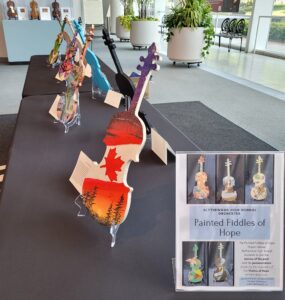
Beyond These Walls
Russell’s motto is “beyond these walls,” because of the ubiquitous nature of music. “Music is not just something we do during my 40-minute class; music is all around us,” she says. “Past the walls of our building, there is so much more.”
Her passion for music goes back to her teen years, when a teacher play a record by the band They Might Be Giants. “It just stuck with me my entire life,” Russell says. “He said, ‘Everything in music theory is happening here.’”
Now, Russell gets to teach the next generation, with kids who are consuming so much music ranging from Taylor Swift to Kanye West. The variety is wonderful, as many people think of music education as limited to Bach, Beethoven and other classical composers.
“They have their AirPods in all day long,” Russell says. “They really want to show that that there is so much more than Top 40 and dead white guys.”









